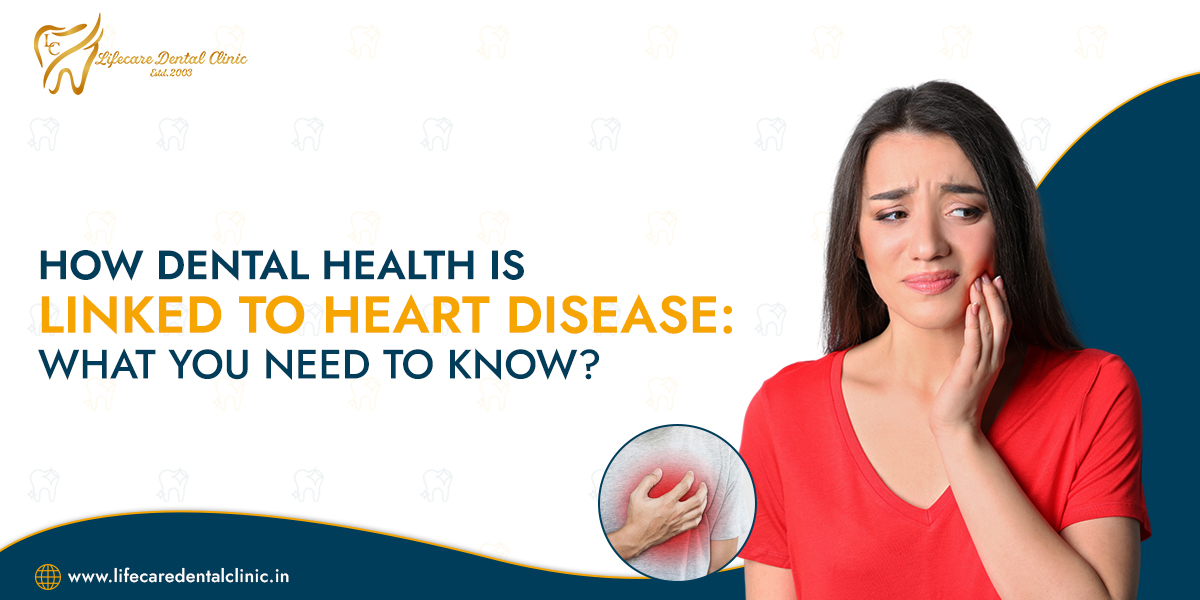How Dental Health is Linked to Heart Disease: What You Need to Know

Published Date: January 02, 2025 Last Update: January 02, 2025
Author: Dr. Diksha Jha
When you think of heart disease, you probably associate it with lifestyle factors like diet, exercise, and smoking. However, emerging research has shown that your dental health can also play a significant role in the risk of developing heart disease. From teeth cleaning to regular visits to your trusted dentist at Lifecare Dental Clinic in Panchkula, taking care of your oral health may be an important step toward maintaining a healthy heart.
Here’s how dental hygiene is connected to heart disease and why you should pay more attention to your teeth henceforth.
The Link Between Oral Health and Heart Disease
All decay starts with germs- Poor oral hygiene leads to the growth of bacteria on your teeth and gums causing plaque to build up resulting in gum disease (also known as periodontal disease). This condition is witnessed by chronic inflammation of the gums due to accumulation of bacteria in the mouth.
Here's how the link works:
1. Bacteria Enter the Bloodstream
When you neglect teeth cleaning and allow germs to accumulate in your mouth, it can lead to gum infections which is a gateway for them to enter the bloodstream and lead to them spread throughout the body. The presence of harmful bacteria in the blood has been linked to inflammation, which is a key factor in the development of heart disease.
2. Inflammation Increases Risk of Heart Disease
The chronic inflammation caused by gum disease can contribute to the formation of plaque in the arteries (atherosclerosis). Over time, this plaque can harden, narrowing the arteries and restricting blood flow. Reduced blood flow to the heart can increase the risk of heart attacks, strokes, and other cardiovascular issues. In fact, research has shown that people with gum disease are more likely to suffer from heart disease than those with healthy gums.
3. Clot Formation and Blood Flow Issues
In some cases, bacteria from the mouth can also contribute to blood clot formation. This can lead to clotting issues that further disrupt blood flow to vital organs, including the heart. Additionally, the bacteria may promote the creation of sticky substances in the blood, which can cause platelets to clump together and form clots.
4. Health Complications in People with Existing Heart Disease
If you already have heart disease, the presence of gum disease can make matters worse. The inflammation and bacteria from the gums can exacerbate the progression of cardiovascular conditions. Maintaining good oral health is particularly important for individuals who have a history of heart problems.
Why Teeth Cleaning and Good Dental Hygiene Matter
Maintaining dental hygiene isn’t just about having a bright smile—it’s also crucial for your overall health, including your heart health. Regular teeth cleaning and brushing, along with proper flossing, can significantly reduce the risk of developing gum disease, thereby lowering your chances of heart problems. Here's how you can keep your mouth (and heart) healthy:
1. Regular Professional Teeth Cleanings
Even with regular brushing at home, plaque and tartar can build up over time, especially in hard-to-reach areas. Visiting Lifecare Dental clinic, your best dental clinic near me in Panchkula, for professional cleanings every 6 months ensures that your teeth and gums are thoroughly cleaned and any plaque or tartar is removed. During these visits, your dentist will also check for early signs of gum disease, cavities, and other oral health issues.
2. Brushing and Flossing Regularly
Good oral hygiene starts at home. Brushing your teeth at least twice a day with fluoride toothpaste and flossing once a day can help prevent the build-up of plaque, reducing the risk of gum disease and the bacteria that can enter your bloodstream. Make sure to replace your toothbrush every few months and use gentle strokes when brushing to avoid damaging your gums.
3. Don’t Ignore Warning Signs of Gum Disease
If you notice any of the following symptoms, don’t delay seeking professional dental care:
- Red, swollen, or bleeding gums
- Persistent bad breath
- Receding gums
- Loose teeth
These could be signs of gum disease, which requires professional treatment. Early intervention can prevent further complications, including potential heart problems.
Conclusion: Keep Your Heart and Teeth Healthy Together
Maintaining dental hygiene isn’t just about a bright healthy smile—it’s also an important step in protecting your overall health, including your heart. By prioritizing regular teeth cleaning, brushing, flossing, and visits to Lifecare Dental Clinic, your trusted dentist in Panchkula, you can help prevent gum disease and reduce your risk of heart disease.
Remember, the link between oral health and heart disease is real. Don’t wait until it’s too late—start taking care of your mouth and your heart today! If you’re looking for a dental clinic near me, call on +918591297780 to book your appointment with qualified professionals who can guide you on the right path to better health. Your heart will thank you!

Leave A Reply